
awesome-ai-apps
A collection of projects showcasing RAG, agents, workflows, and other AI use cases
Stars: 6134
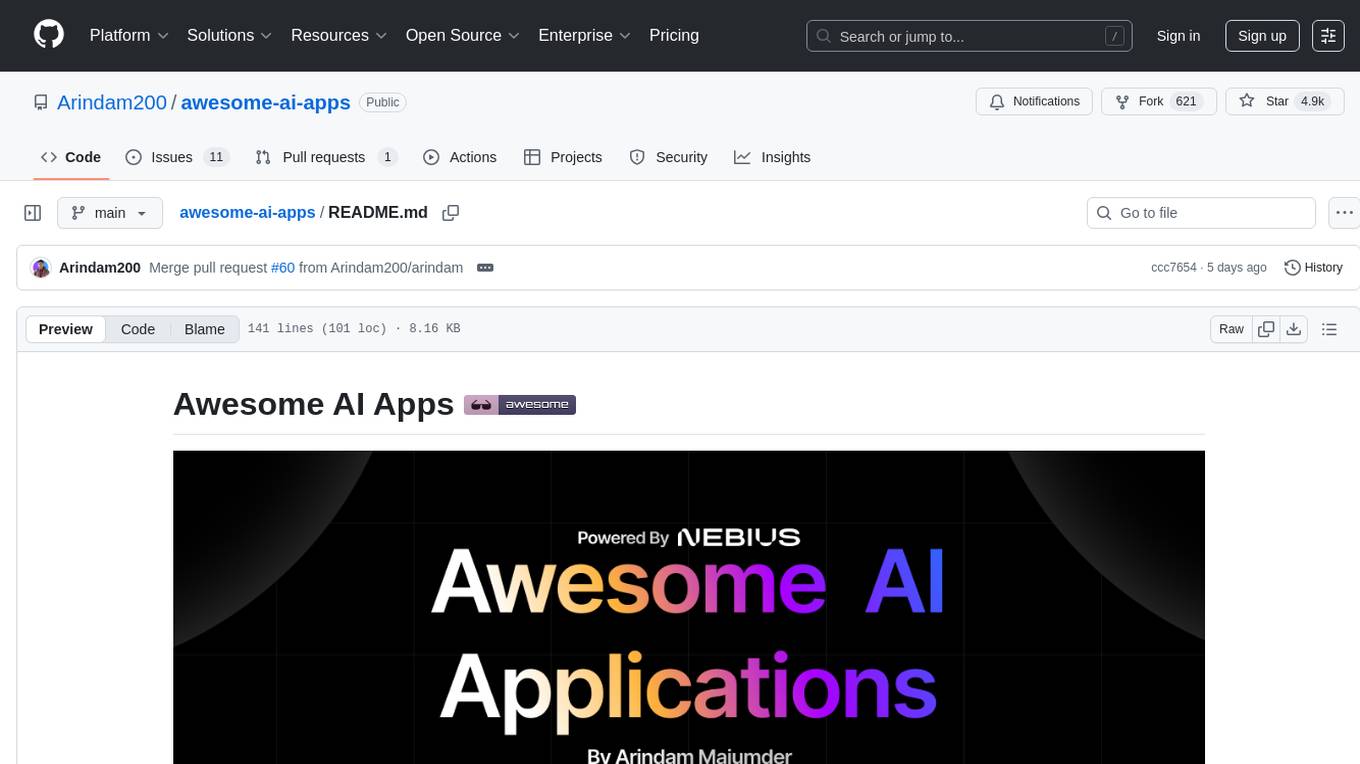
This repository is a comprehensive collection of practical examples, tutorials, and recipes for building powerful LLM-powered applications. From simple chatbots to advanced AI agents, these projects serve as a guide for developers working with various AI frameworks and tools. Powered by Nebius AI Studio - your one-stop platform for building and deploying AI applications.
README:
This repository is a comprehensive collection of practical examples, tutorials, and recipes for building powerful LLM-powered applications. From simple chatbots to advanced AI agents, these projects serve as a guide for developers working with various AI frameworks and tools.
A huge thank you to our sponsors for their generous support!
|
Web Data Platform 
|
AI Inference Provider 
|
AI Web Scraping framework 
|
AI for Databases 
|
Interested in sponsoring this project? Feel free to reach out!


Quick-start agents for learning and extending:
- Agno HackerNews Analysis - Agno-based agent for trend analysis on HackerNews.
- OpenAI SDK Starter - OpenAI Agents SDK based email helper & haiku writer.
- LlamaIndex Task Manager - LlamaIndex-powered task assistant.
- CrewAI Research Crew - Multi-agent research team.
- PydanticAI Weather Bot - Real-time weather info.
- LangChain-LangGraph Starter - LangChain + LangGraph starter.
- AWS Strands Agent Starter - Weather report Agent.
- Camel AI Starter - Performance benchmarking tool that compares the performance of various AI models.
Straightforward, practical use-cases:
- Finance Agent - Tracks live stock & market data.
- Human-in-the-Loop Agent - HITL actions for safe AI tasks.
- Newsletter Generator - AI newsletter builder with Firecrawl.
- Reasoning Agent - Financial reasoning step-by-step.
- Agno UI Example - UI for web & finance agents.
- Mastra Weather Bot - Weather updates with Mastra AI.
- Calendar Assistant - Calendar scheduling with Cal.com.
- Web Automation Agent - Simple Browser Agent implementation with Nebius & browser use.
- Nebius Chat - Nebius AI Studio Chat interface.
- Talk to Your DB - Talk to your Database with GibsonAI & Langchain
Examples using Model Context Protocol:
- Doc-MCP - Semantic RAG docs & Q&A.
- LangGraph MCP Agent - LangChain ReAct agent with Couchbase.
- GitHub MCP Agent - Repo insights via MCP.
- MCP Starter - GitHub repo analyzer starter.
- Talk to your Docs - Documentation QnA Agent
- Database MCP Agent - A conversational AI agent for managing GibsonAI database projects and schemas.
Agents with advanced memory capabilities:
- Agno Memory Agent - Agno-based agent with persistent memory.
- arXiv Researcher Agent with Memori - Research assistant using OpenAI Agents and GibsonAI Memori.
- AWS Strands Agent with Memori - AWS Strands agent enhanced with Memori memory.
- Blog Writing Agent - Personalized blog writing agent with memory.
- Social Media Agent - Social media automation agent with memory.
Retrieve-augmented generation examples:
- Agentic RAG - Agentic RAG with Agno & GPT 5.
- Agentic RAG with Web Search - Advanced RAG with CrewAI, Qdrant, and Exa for hybrid search.
- Resume Optimizer - Boost resumes with AI.
- LlamaIndex RAG Starter - LlamaIndex + Nebius RAG starter.
- PDF RAG Analyzer - Chat with multiple PDFs.
- Qwen3 RAG Chat - PDF chatbot with Streamlit.
- Chat with Code - Conversational code explorer.
- Gemma3 OCR - OCR-based document and image processor using Gemma3
- Contextual AI RAG - Enterprise-level RAG with managed datastores and quality evaluation.
Complex pipelines for end-to-end workflows:
- Deep Researcher - Multi-stage research with Agno & Scrapegraph AI.
- Candilyzer - Analyze GitHub/LinkedIn profiles.
- Job Finder - LinkedIn job search with Bright Data.
- AI Trend Analyzer - AI trend mining with Google ADK.
- Conference Talk Generator - Draft talk abstracts with Google ADK & Couchbase.
- Finance Service Agent - FastAPI server for stock data and predictions with Agno.
- Price Monitoring Agent - Price monitoring and alerting Agent powered by CrewAi, Twilio & Nebius.
- Startup Idea Validator Agent - Agentic Workflow to validate and analyze startup ideas.
- Meeting Assistant Agent - Agentic Workflow that send meeting notes and creates task based on conversation.
- Ai Hedgefund - Agentic Workflow for financial analysis
- Python 3.10 or higher
- Git
- pip (Python package manager) or uv
-
Clone the repository
git clone https://github.com/Arindam200/awesome-ai-apps.git
-
Navigate to the desired project directory
cd awesome-ai-apps/starter_ai_agents/agno_starter -
Install the required dependencies
pip install -r requirements.txt
-
Follow project-specific instructions
- Each project has its own README.md with detailed setup and usage instructions
- Make sure to read the project-specific documentation before running the application
We welcome contributions from the community! If you'd like to contribute, please see our Contributing Guidelines for more information on how to get started.
Please note that this project is released with a Contributor Code of Conduct. By participating in this project you agree to abide by its terms.
This repository is licensed under the MIT License. Feel free to use and modify the examples for your projects.
For Tasks:
Click tags to check more tools for each tasksFor Jobs:
Alternative AI tools for awesome-ai-apps
Similar Open Source Tools

awesome-ai-apps
This repository is a comprehensive collection of practical examples, tutorials, and recipes for building powerful LLM-powered applications. From simple chatbots to advanced AI agents, these projects serve as a guide for developers working with various AI frameworks and tools. Powered by Nebius AI Studio - your one-stop platform for building and deploying AI applications.
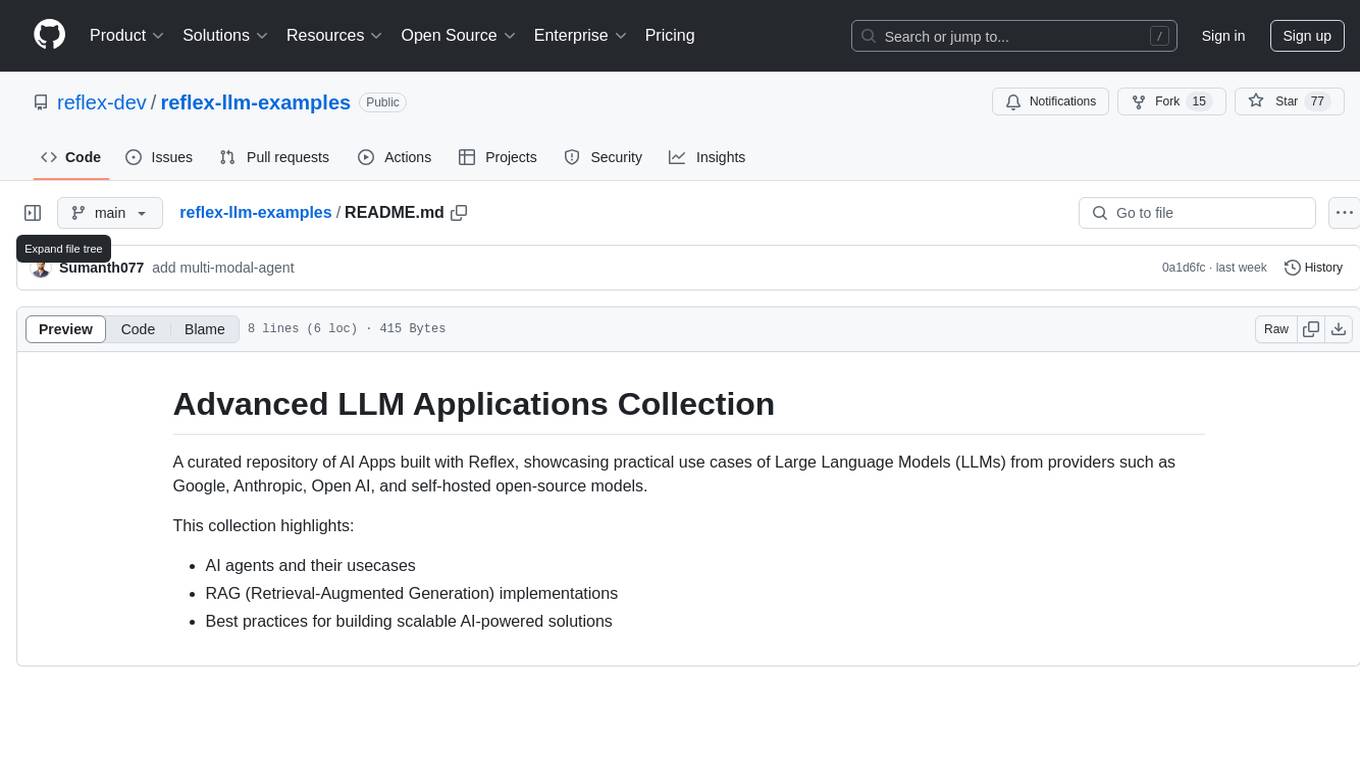
reflex-llm-examples
A curated repository of AI Apps showcasing practical use cases of Large Language Models (LLMs) from various providers like Google, Anthropic, Open AI, and self-hosted open-source models. The collection features AI agents, RAG (Retrieval-Augmented Generation) implementations, and best practices for building scalable AI-powered solutions.
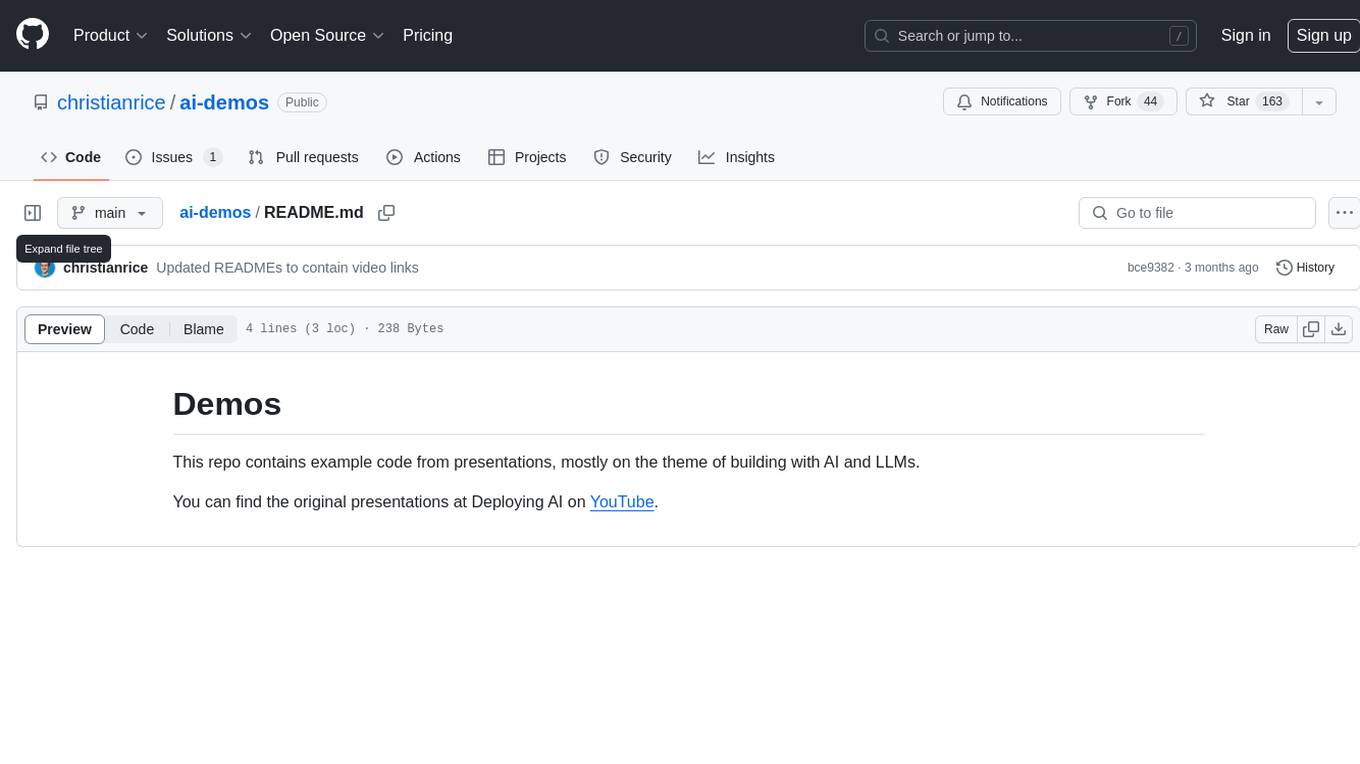
ai-demos
The 'ai-demos' repository is a collection of example code from presentations focusing on building with AI and LLMs. It serves as a resource for developers looking to explore practical applications of artificial intelligence in their projects. The code snippets showcase various techniques and approaches to leverage AI technologies effectively. The repository aims to inspire and educate developers on integrating AI solutions into their applications.
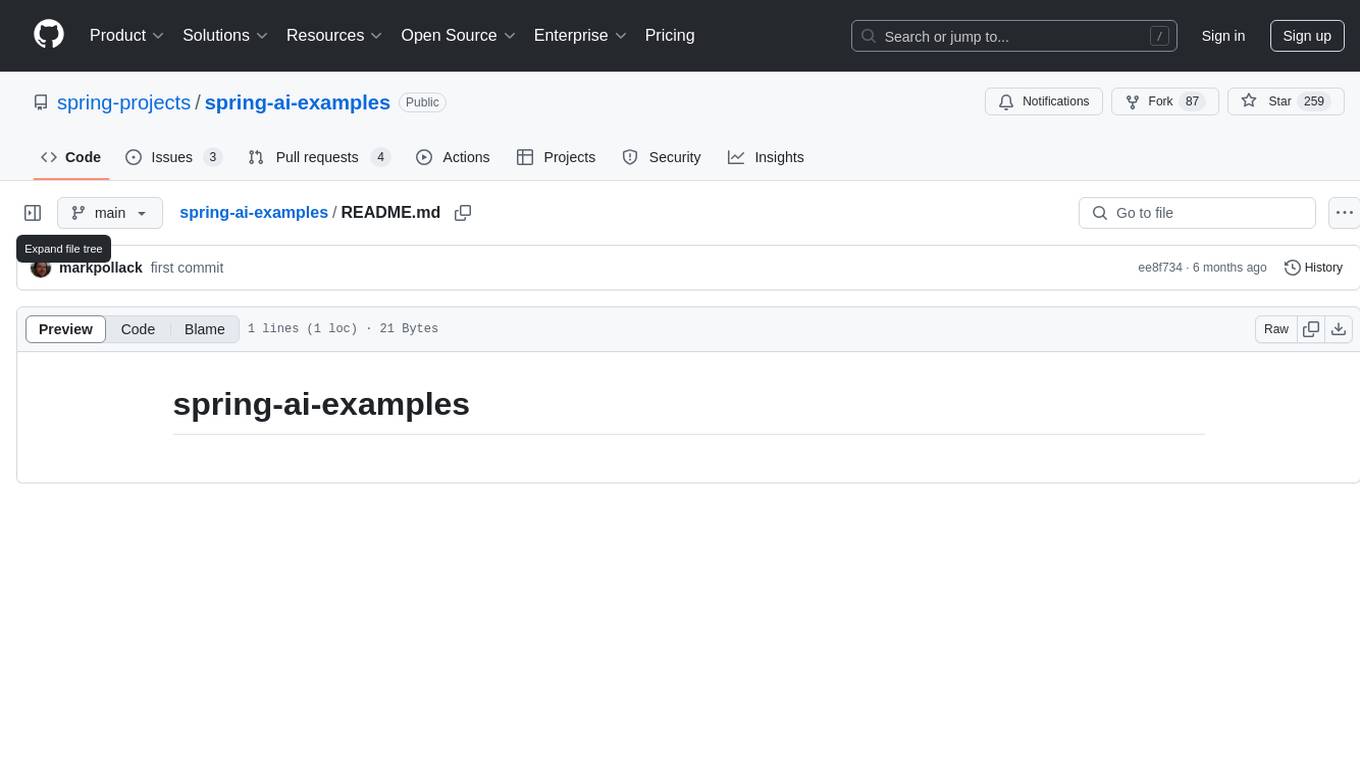
spring-ai-examples
Spring AI Examples is a repository containing various examples of integrating artificial intelligence capabilities into Spring applications. The examples cover a wide range of AI technologies such as machine learning, natural language processing, computer vision, and more. These examples serve as a practical guide for developers looking to incorporate AI functionalities into their Spring projects.
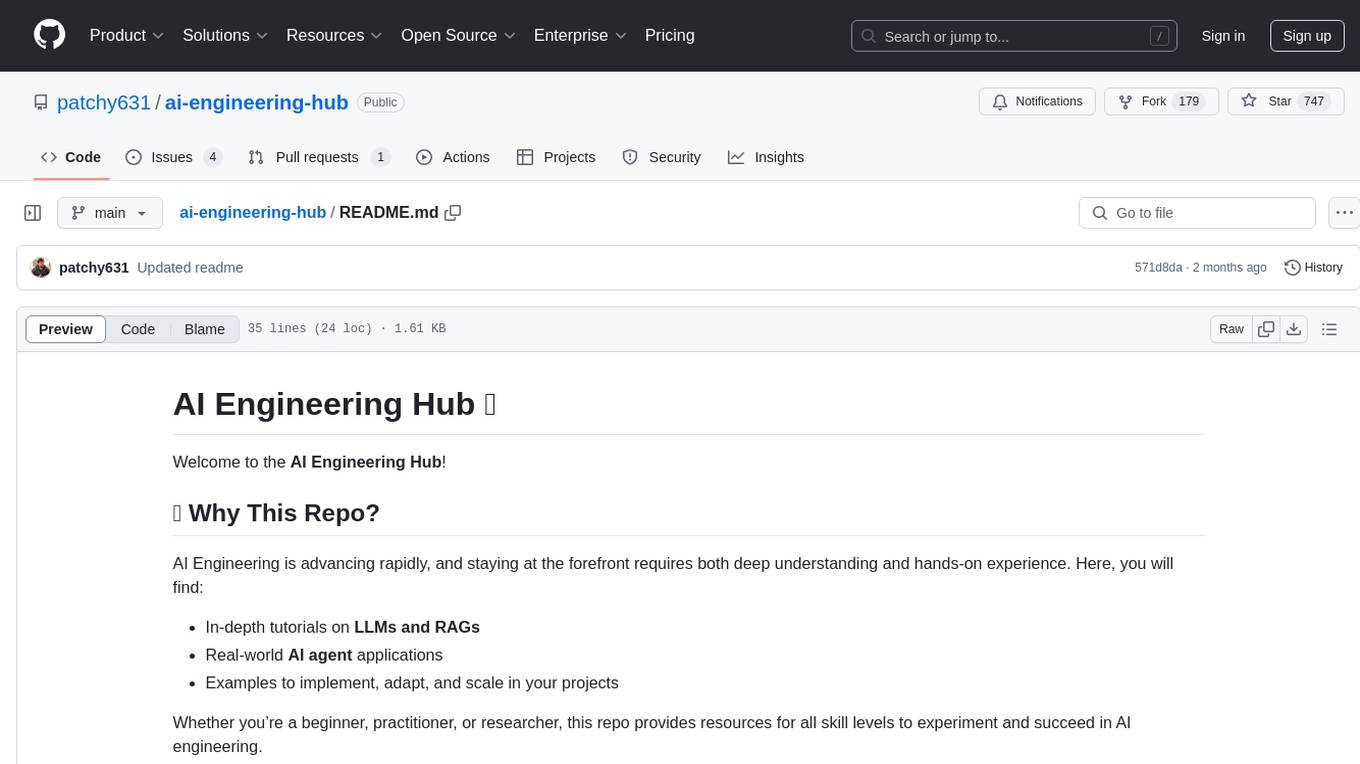
ai-engineering-hub
The AI Engineering Hub is a repository that provides in-depth tutorials on LLMs and RAGs, real-world AI agent applications, and examples to implement, adapt, and scale in projects. It caters to beginners, practitioners, and researchers, offering resources for all skill levels to experiment and succeed in AI engineering.

open-ai
Open AI is a powerful tool for artificial intelligence research and development. It provides a wide range of machine learning models and algorithms, making it easier for developers to create innovative AI applications. With Open AI, users can explore cutting-edge technologies such as natural language processing, computer vision, and reinforcement learning. The platform offers a user-friendly interface and comprehensive documentation to support users in building and deploying AI solutions. Whether you are a beginner or an experienced AI practitioner, Open AI offers the tools and resources you need to accelerate your AI projects and stay ahead in the rapidly evolving field of artificial intelligence.
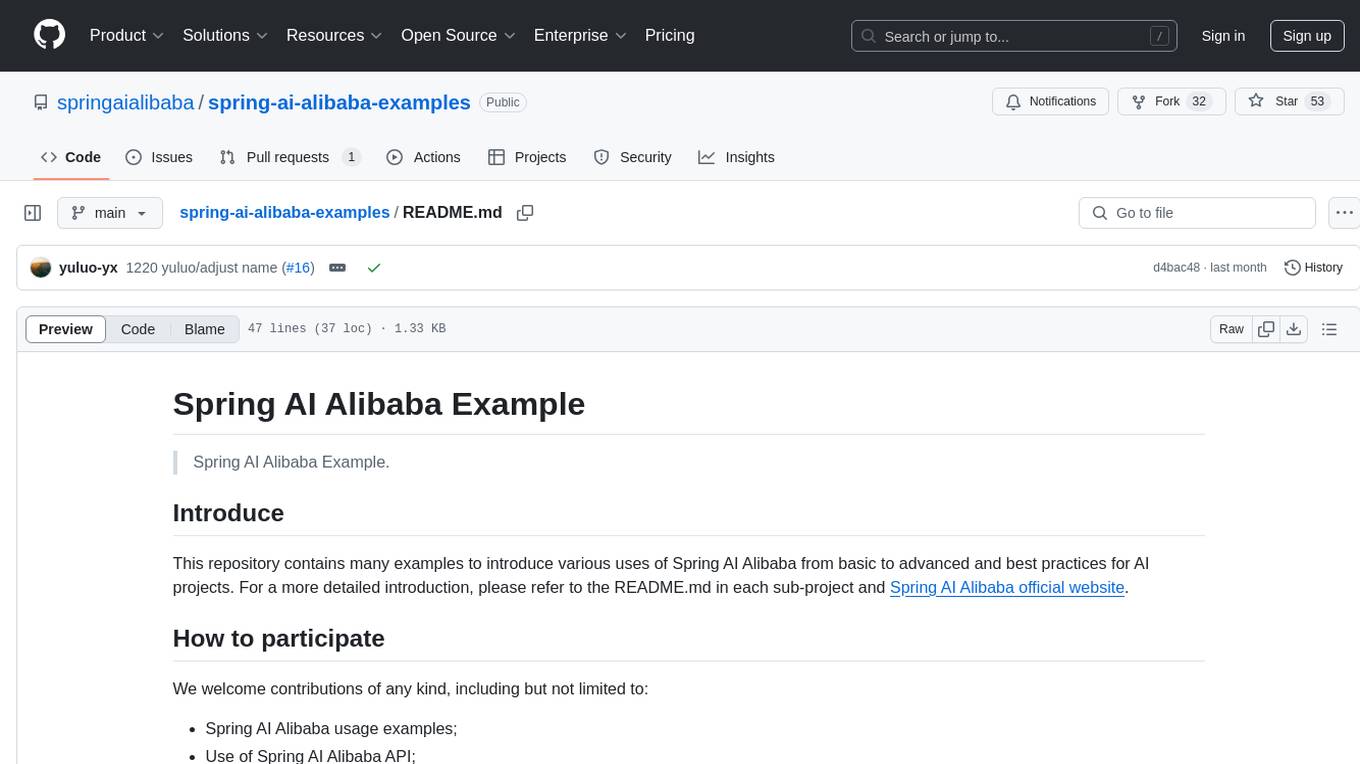
spring-ai-alibaba-examples
This repository contains examples showcasing various uses of Spring AI Alibaba, from basic to advanced, and best practices for AI projects. It welcomes contributions related to Spring AI Alibaba usage examples, API usage, Spring AI usage examples, and best practices for AI projects. The project structure is designed to modularize functions for easy access and use.
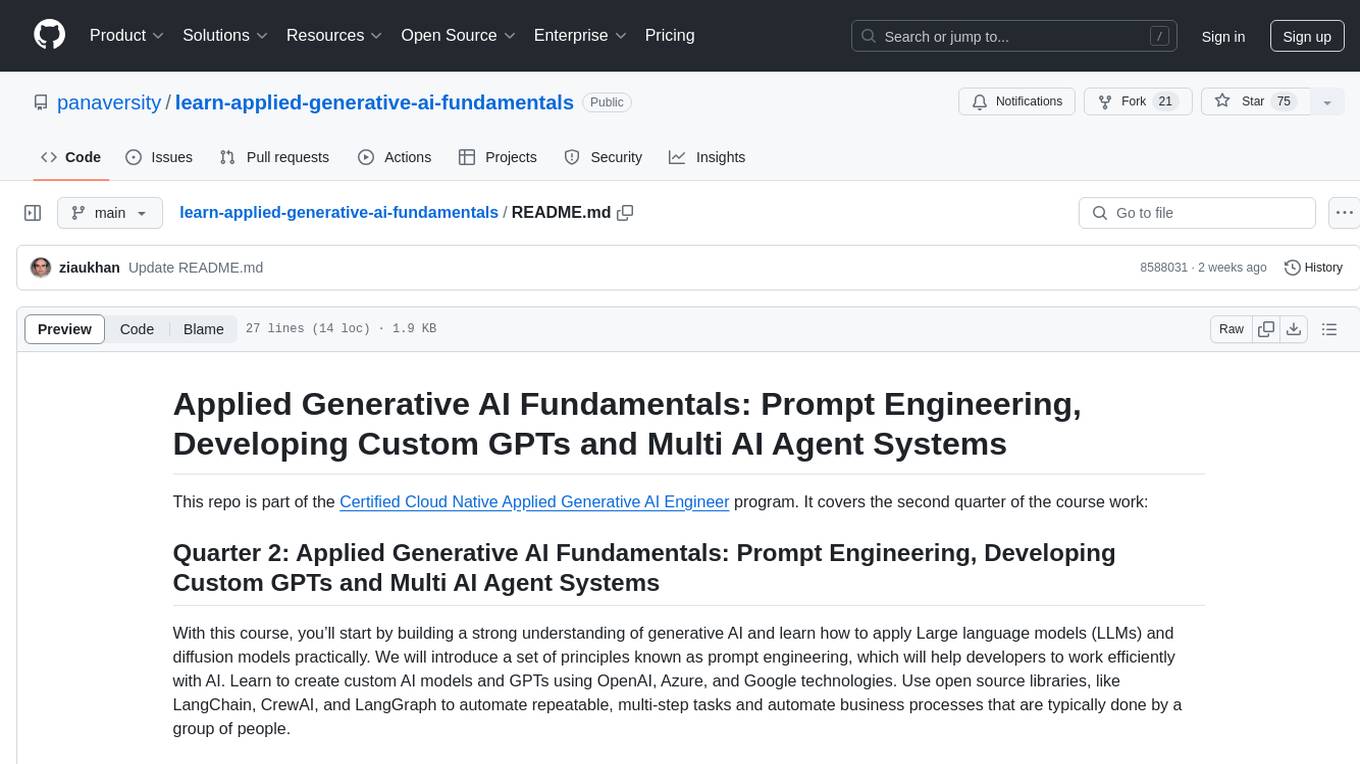
learn-applied-generative-ai-fundamentals
This repository is part of the Certified Cloud Native Applied Generative AI Engineer program, focusing on Applied Generative AI Fundamentals. It covers prompt engineering, developing custom GPTs, and Multi AI Agent Systems. The course helps in building a strong understanding of generative AI, applying Large Language Models (LLMs) and diffusion models practically. It introduces principles of prompt engineering to work efficiently with AI, creating custom AI models and GPTs using OpenAI, Azure, and Google technologies. It also utilizes open source libraries like LangChain, CrewAI, and LangGraph to automate tasks and business processes.
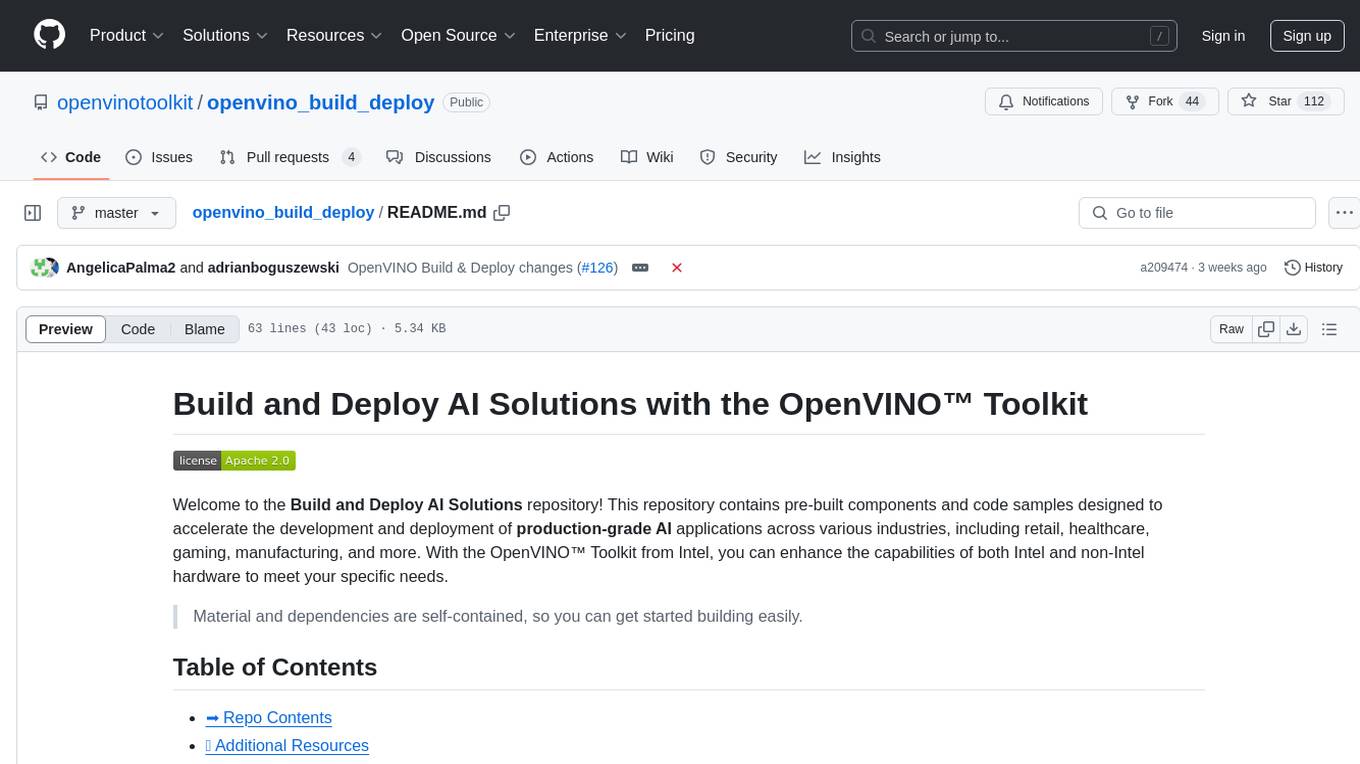
openvino_build_deploy
The OpenVINO Build and Deploy repository provides pre-built components and code samples to accelerate the development and deployment of production-grade AI applications across various industries. With the OpenVINO Toolkit from Intel, users can enhance the capabilities of both Intel and non-Intel hardware to meet specific needs. The repository includes AI reference kits, interactive demos, workshops, and step-by-step instructions for building AI applications. Additional resources such as Jupyter notebooks and a Medium blog are also available. The repository is maintained by the AI Evangelist team at Intel, who provide guidance on real-world use cases for the OpenVINO toolkit.
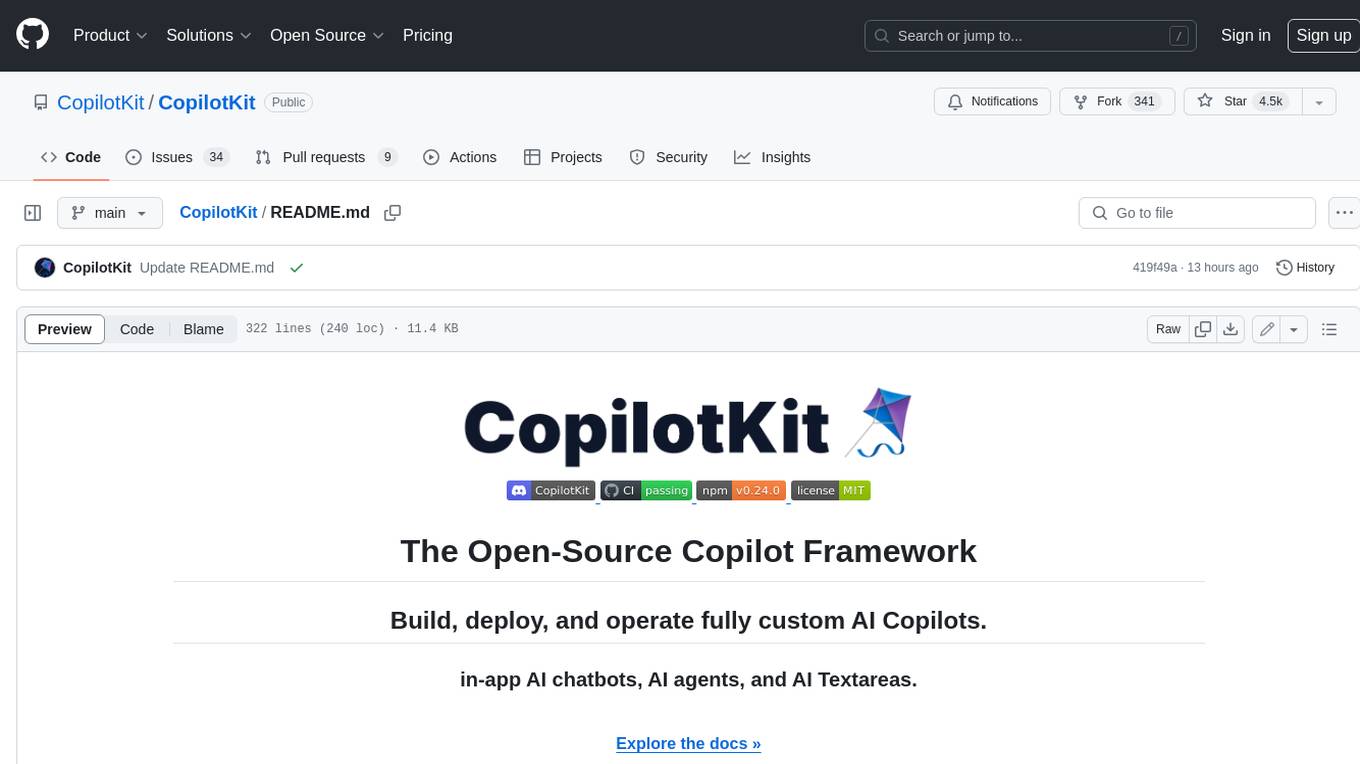
CopilotKit
CopilotKit is an open-source framework for building, deploying, and operating fully custom AI Copilots, including in-app AI chatbots, AI agents, and AI Textareas. It provides a set of components and entry points that allow developers to easily integrate AI capabilities into their applications. CopilotKit is designed to be flexible and extensible, so developers can tailor it to their specific needs. It supports a variety of use cases, including providing app-aware AI chatbots that can interact with the application state and take action, drop-in replacements for textareas with AI-assisted text generation, and in-app agents that can access real-time application context and take action within the application.
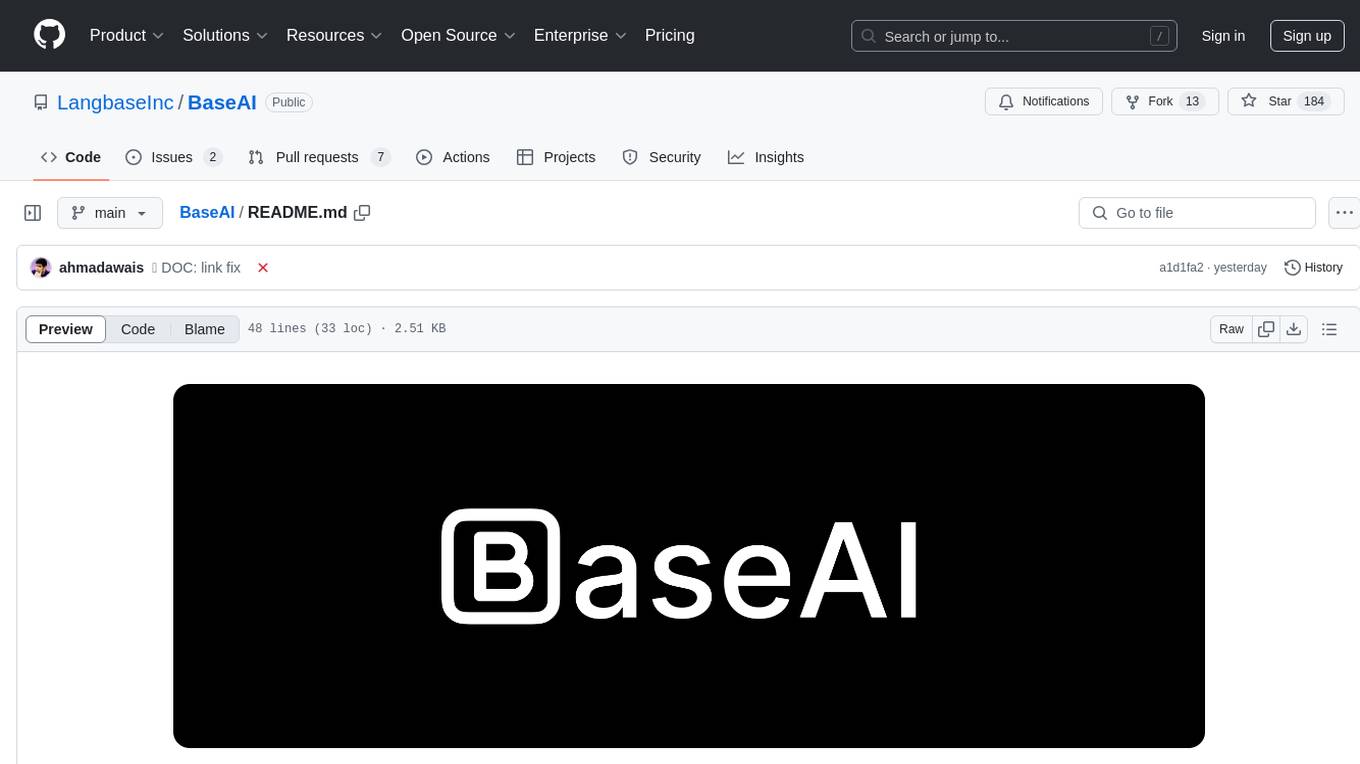
BaseAI
BaseAI is an AI framework designed for creating declarative and composable AI-powered LLM products. It enables the development of AI agent pipes locally, incorporating agentic tools and memory (RAG). The framework offers a learn guide for beginners to kickstart their journey with BaseAI. For detailed documentation, users can visit baseai.dev/docs. Contributions to BaseAI are encouraged, and interested individuals can refer to the Contributing Guide. The original authors of BaseAI include Ahmad Awais, Ashar Irfan, Saqib Ameen, Saad Irfan, and Ahmad Bilal. Security vulnerabilities can be reported privately via email to [email protected]. BaseAI aims to provide resources for learning AI agent development, utilizing agentic tools and memory.
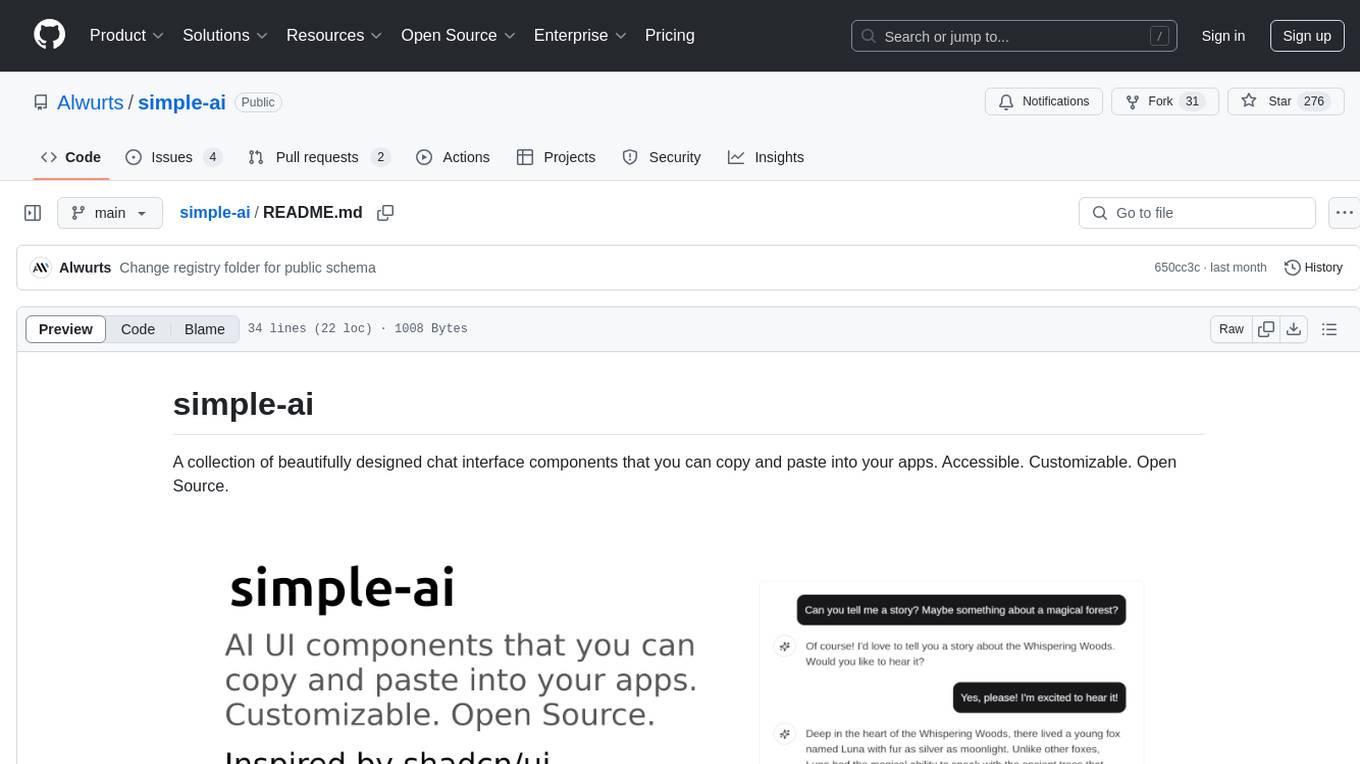
simple-ai
Simple AI is a lightweight Python library for implementing basic artificial intelligence algorithms. It provides easy-to-use functions and classes for tasks such as machine learning, natural language processing, and computer vision. With Simple AI, users can quickly prototype and deploy AI solutions without the complexity of larger frameworks.
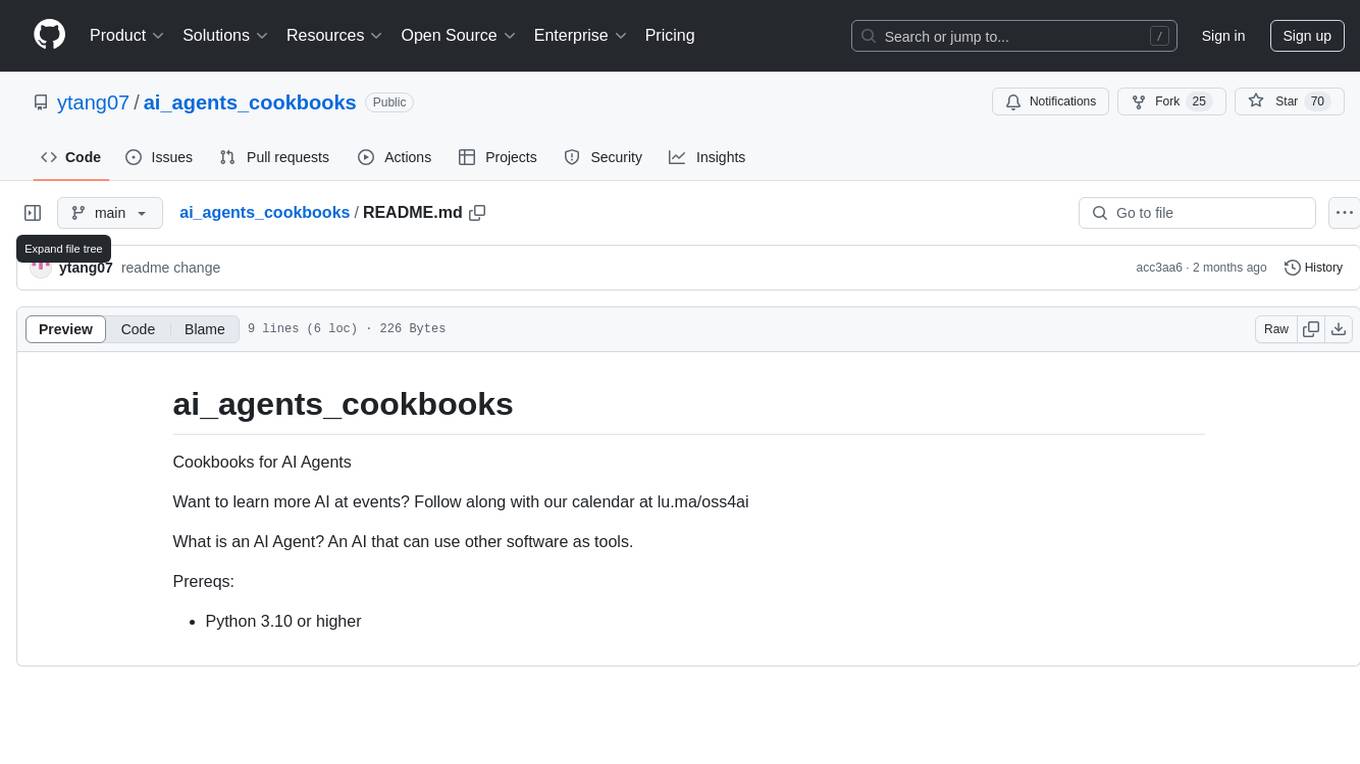
ai_agents_cookbooks
The 'ai_agents_cookbooks' repository contains cookbooks for AI agents, which are AI systems capable of using other software as tools. It provides resources for learning more about AI through events and requires Python 3.10 or higher as a prerequisite.

lemonai
LemonAI is a versatile machine learning library designed to simplify the process of building and deploying AI models. It provides a wide range of tools and algorithms for data preprocessing, model training, and evaluation. With LemonAI, users can easily experiment with different machine learning techniques and optimize their models for various tasks. The library is well-documented and beginner-friendly, making it suitable for both novice and experienced data scientists. LemonAI aims to streamline the development of AI applications and empower users to create innovative solutions using state-of-the-art machine learning methods.
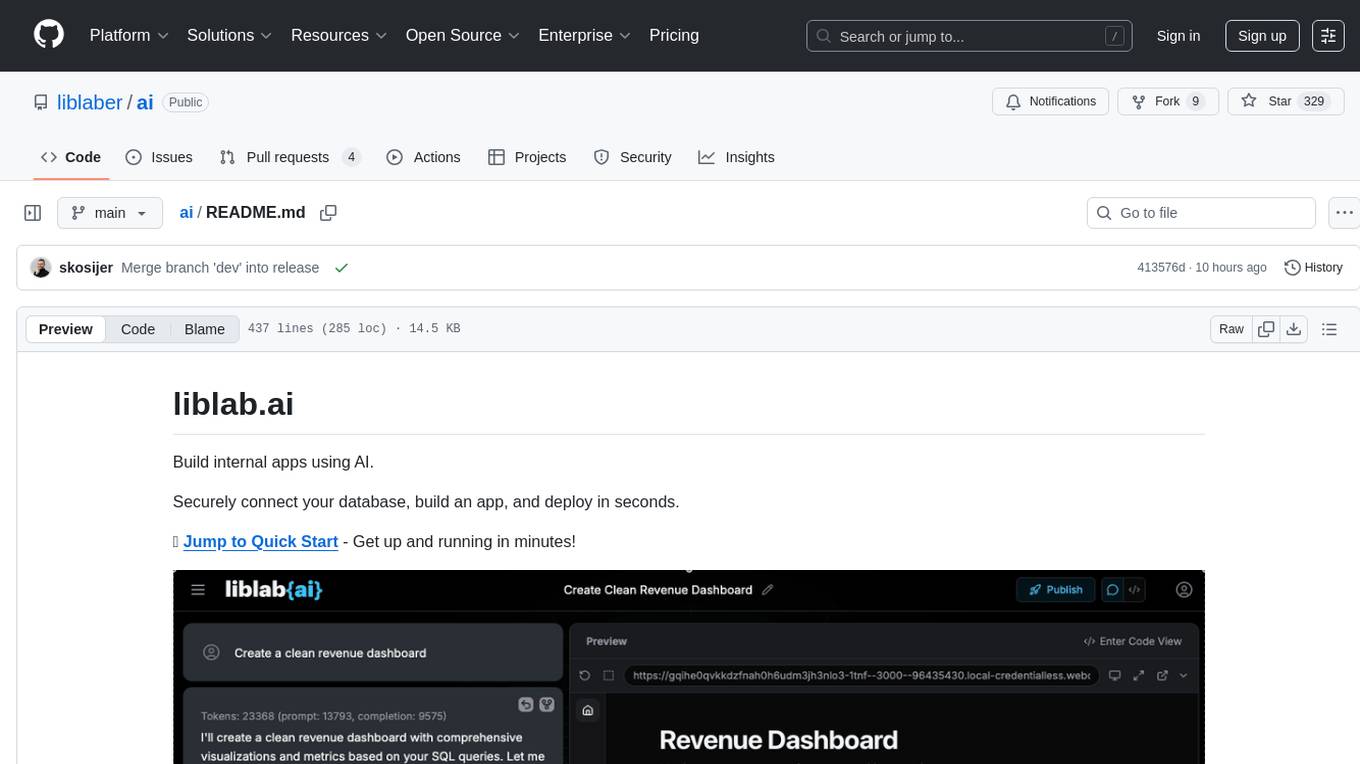
ai
This repository contains a collection of AI algorithms and models for various machine learning tasks. It provides implementations of popular algorithms such as neural networks, decision trees, and support vector machines. The code is well-documented and easy to understand, making it suitable for both beginners and experienced developers. The repository also includes example datasets and tutorials to help users get started with building and training AI models. Whether you are a student learning about AI or a professional working on machine learning projects, this repository can be a valuable resource for your development journey.
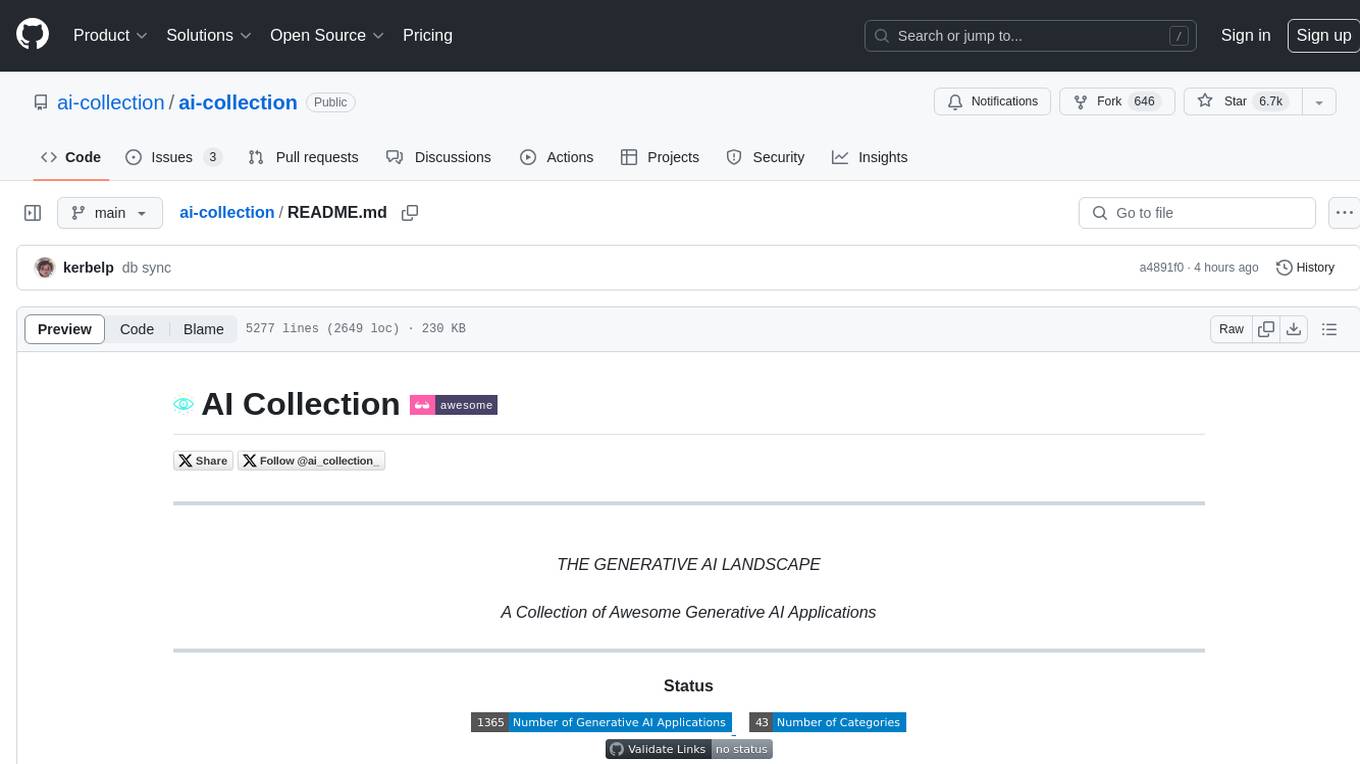
ai-collection
The ai-collection repository is a collection of various artificial intelligence projects and tools aimed at helping developers and researchers in the field of AI. It includes implementations of popular AI algorithms, datasets for training machine learning models, and resources for learning AI concepts. The repository serves as a valuable resource for anyone interested in exploring the applications of artificial intelligence in different domains.
For similar tasks
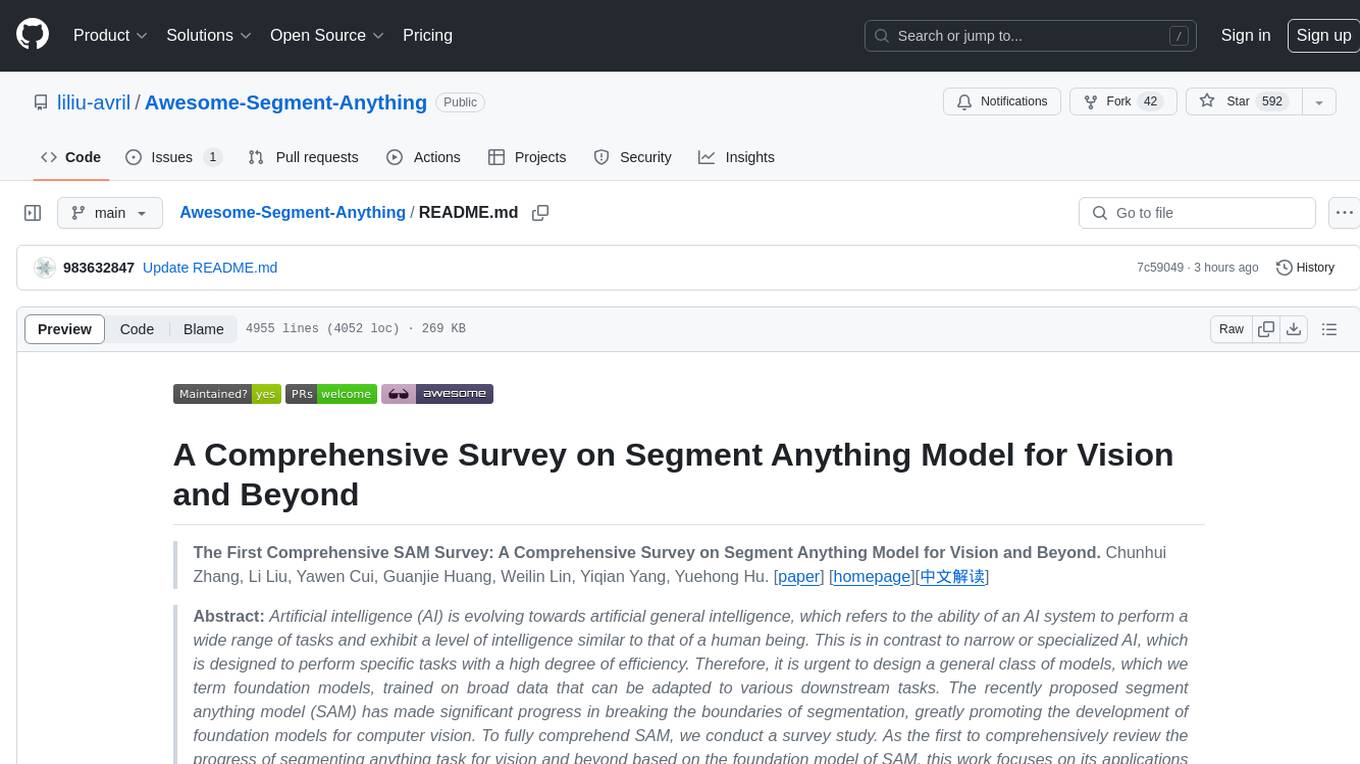
Awesome-Segment-Anything
Awesome-Segment-Anything is a powerful tool for segmenting and extracting information from various types of data. It provides a user-friendly interface to easily define segmentation rules and apply them to text, images, and other data formats. The tool supports both supervised and unsupervised segmentation methods, allowing users to customize the segmentation process based on their specific needs. With its versatile functionality and intuitive design, Awesome-Segment-Anything is ideal for data analysts, researchers, content creators, and anyone looking to efficiently extract valuable insights from complex datasets.
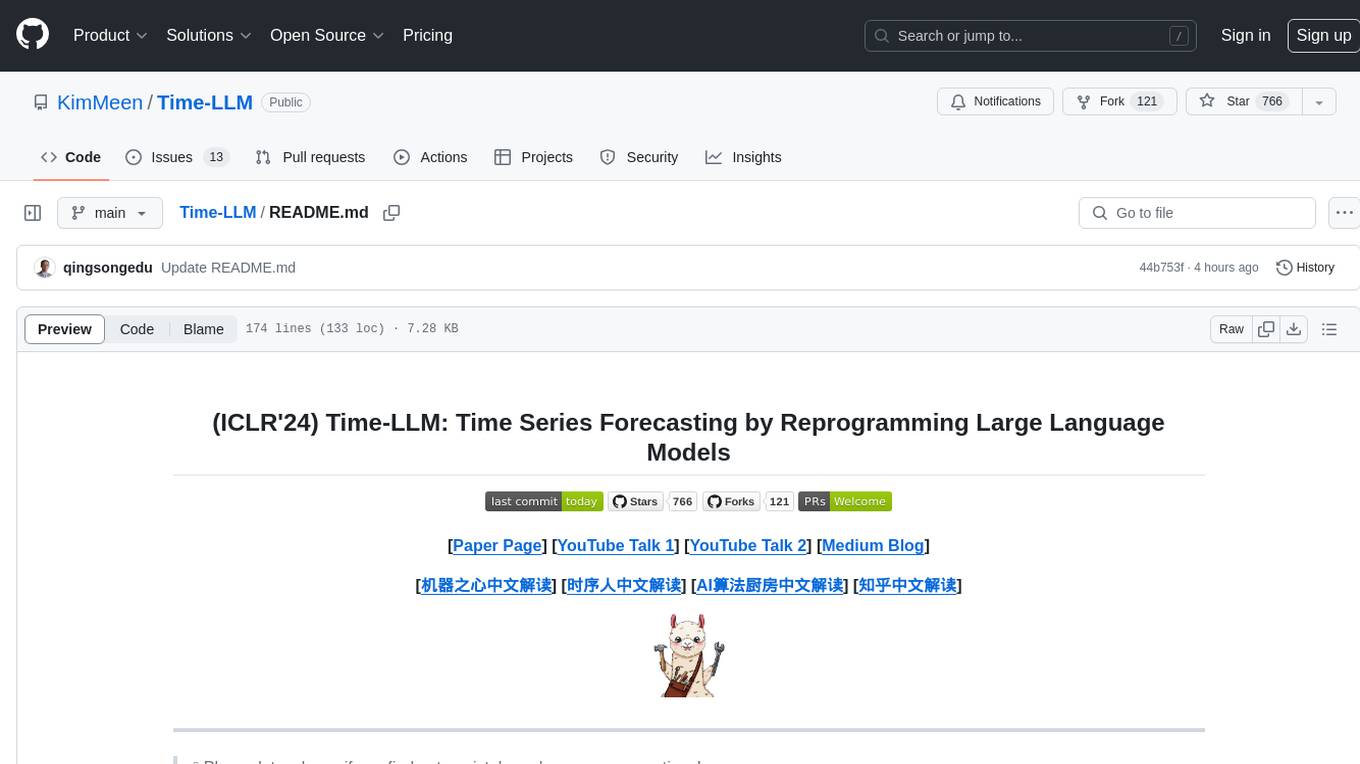
Time-LLM
Time-LLM is a reprogramming framework that repurposes large language models (LLMs) for time series forecasting. It allows users to treat time series analysis as a 'language task' and effectively leverage pre-trained LLMs for forecasting. The framework involves reprogramming time series data into text representations and providing declarative prompts to guide the LLM reasoning process. Time-LLM supports various backbone models such as Llama-7B, GPT-2, and BERT, offering flexibility in model selection. The tool provides a general framework for repurposing language models for time series forecasting tasks.
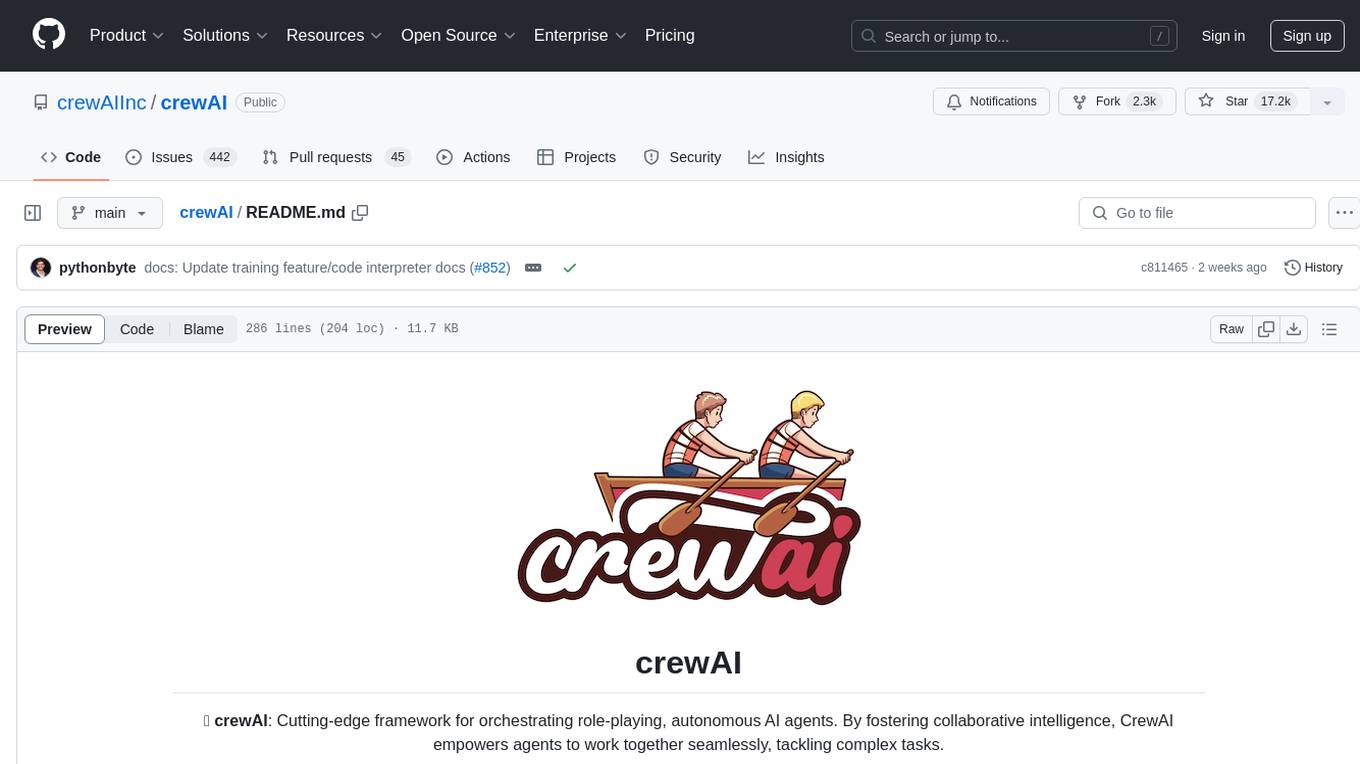
crewAI
CrewAI is a cutting-edge framework designed to orchestrate role-playing autonomous AI agents. By fostering collaborative intelligence, CrewAI empowers agents to work together seamlessly, tackling complex tasks. It enables AI agents to assume roles, share goals, and operate in a cohesive unit, much like a well-oiled crew. Whether you're building a smart assistant platform, an automated customer service ensemble, or a multi-agent research team, CrewAI provides the backbone for sophisticated multi-agent interactions. With features like role-based agent design, autonomous inter-agent delegation, flexible task management, and support for various LLMs, CrewAI offers a dynamic and adaptable solution for both development and production workflows.
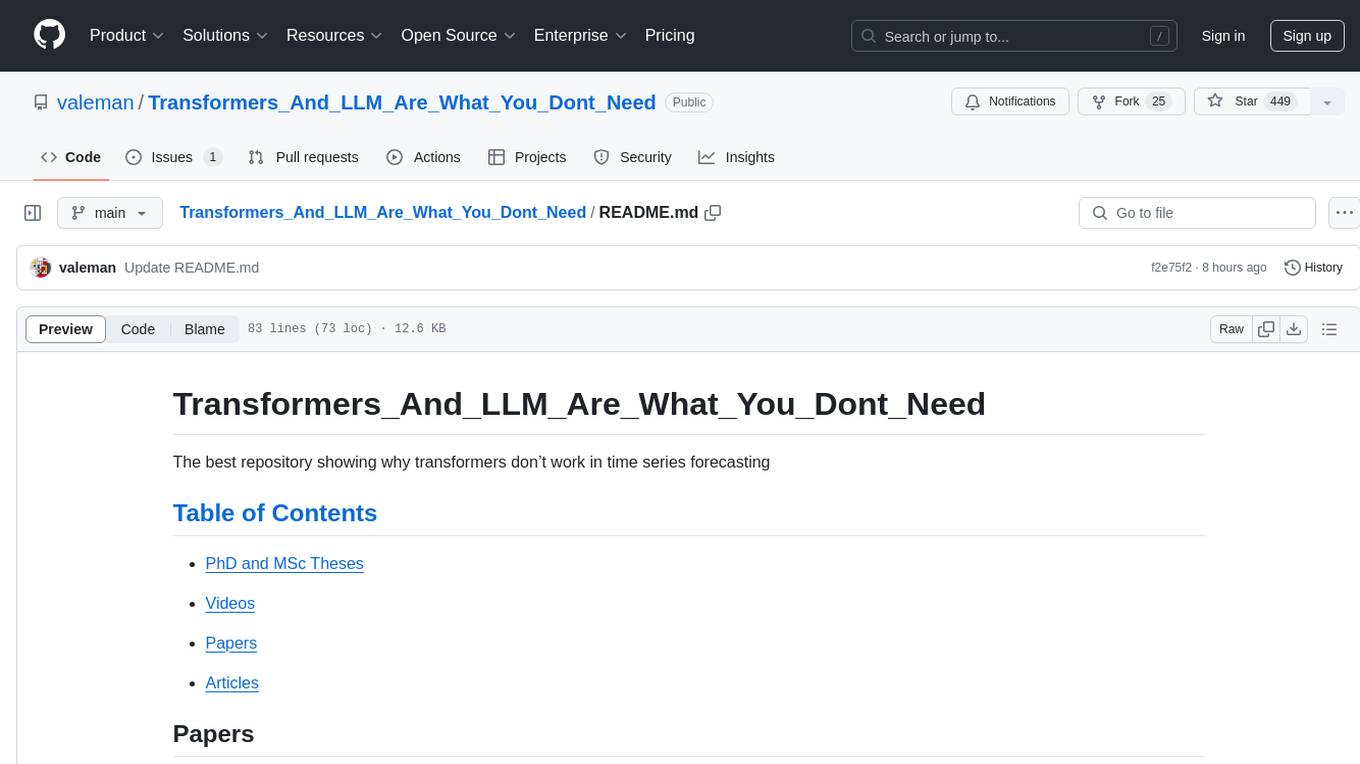
Transformers_And_LLM_Are_What_You_Dont_Need
Transformers_And_LLM_Are_What_You_Dont_Need is a repository that explores the limitations of transformers in time series forecasting. It contains a collection of papers, articles, and theses discussing the effectiveness of transformers and LLMs in this domain. The repository aims to provide insights into why transformers may not be the best choice for time series forecasting tasks.
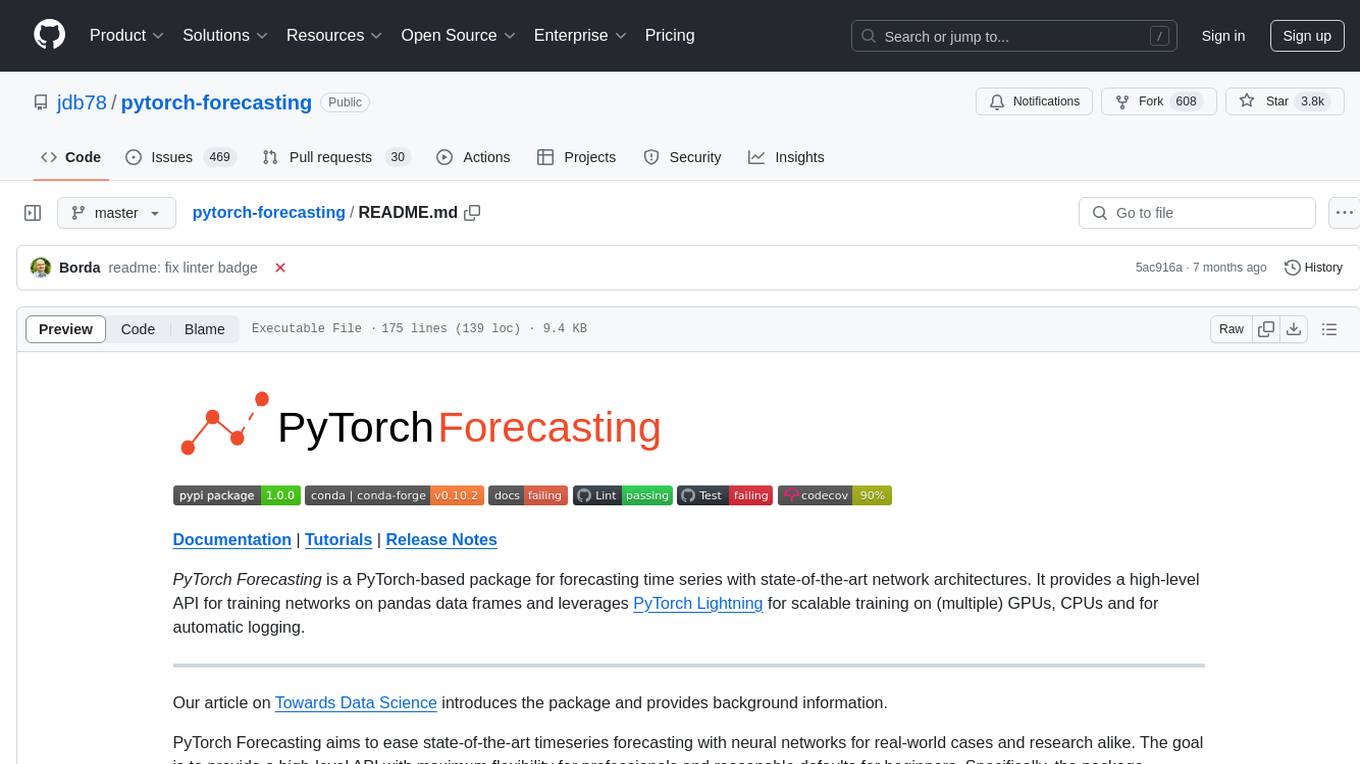
pytorch-forecasting
PyTorch Forecasting is a PyTorch-based package for time series forecasting with state-of-the-art network architectures. It offers a high-level API for training networks on pandas data frames and utilizes PyTorch Lightning for scalable training on GPUs and CPUs. The package aims to simplify time series forecasting with neural networks by providing a flexible API for professionals and default settings for beginners. It includes a timeseries dataset class, base model class, multiple neural network architectures, multi-horizon timeseries metrics, and hyperparameter tuning with optuna. PyTorch Forecasting is built on pytorch-lightning for easy training on various hardware configurations.
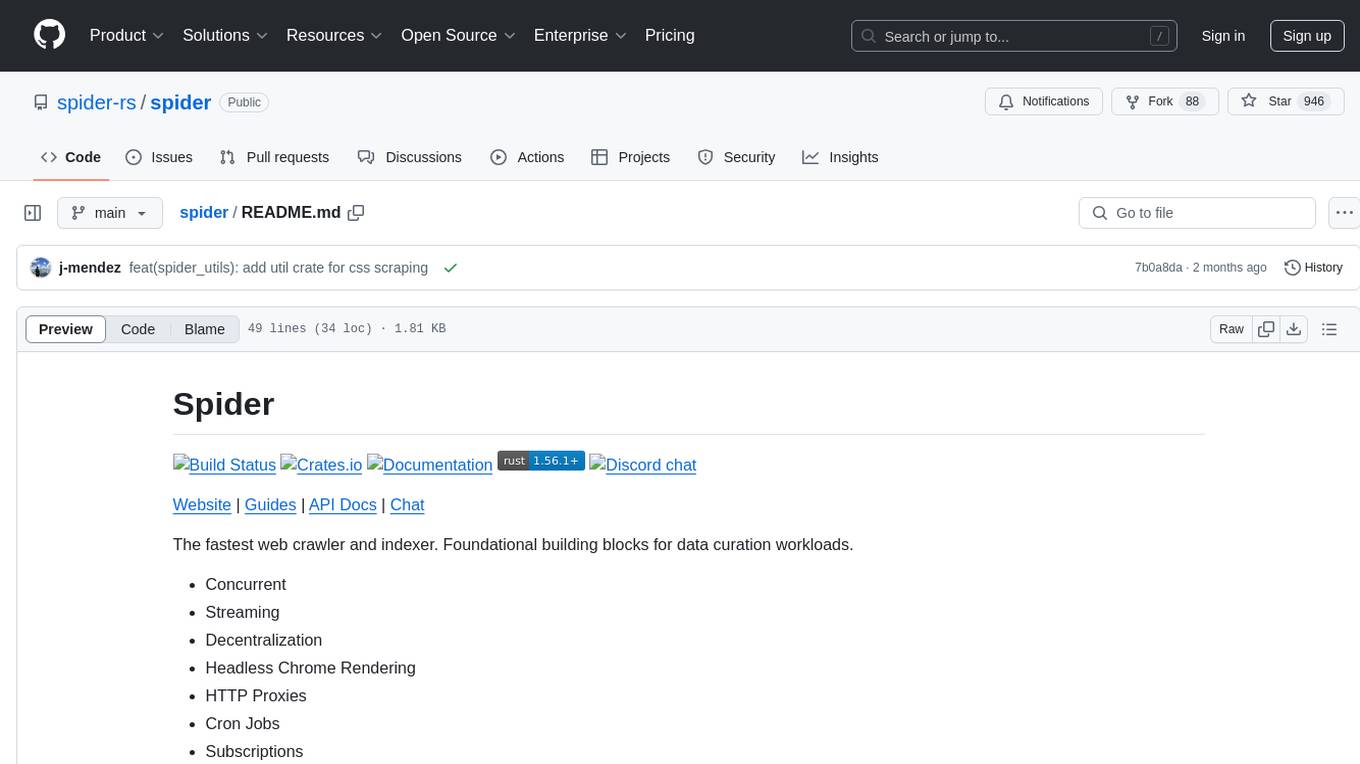
spider
Spider is a high-performance web crawler and indexer designed to handle data curation workloads efficiently. It offers features such as concurrency, streaming, decentralization, headless Chrome rendering, HTTP proxies, cron jobs, subscriptions, smart mode, blacklisting, whitelisting, budgeting depth, dynamic AI prompt scripting, CSS scraping, and more. Users can easily get started with the Spider Cloud hosted service or set up local installations with spider-cli. The tool supports integration with Node.js and Python for additional flexibility. With a focus on speed and scalability, Spider is ideal for extracting and organizing data from the web.
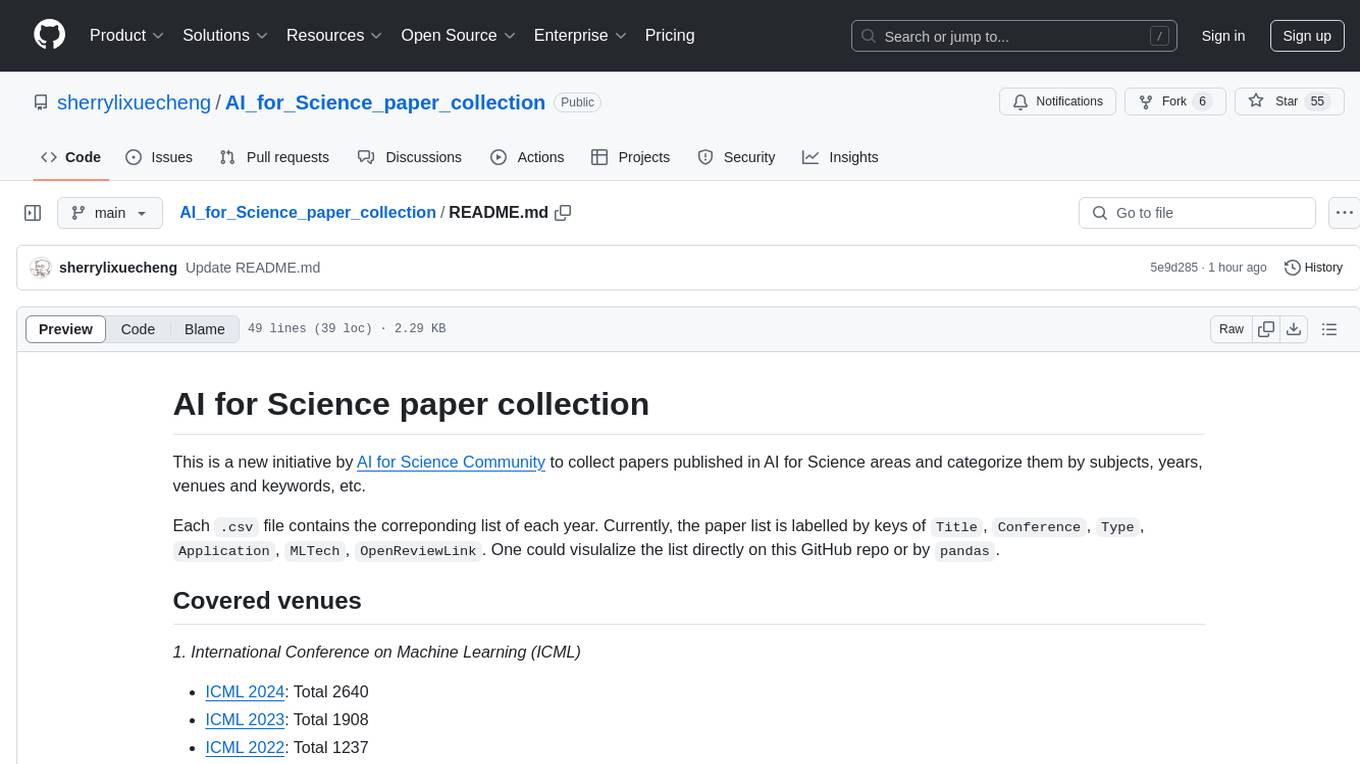
AI_for_Science_paper_collection
AI for Science paper collection is an initiative by AI for Science Community to collect and categorize papers in AI for Science areas by subjects, years, venues, and keywords. The repository contains `.csv` files with paper lists labeled by keys such as `Title`, `Conference`, `Type`, `Application`, `MLTech`, `OpenReviewLink`. It covers top conferences like ICML, NeurIPS, and ICLR. Volunteers can contribute by updating existing `.csv` files or adding new ones for uncovered conferences/years. The initiative aims to track the increasing trend of AI for Science papers and analyze trends in different applications.
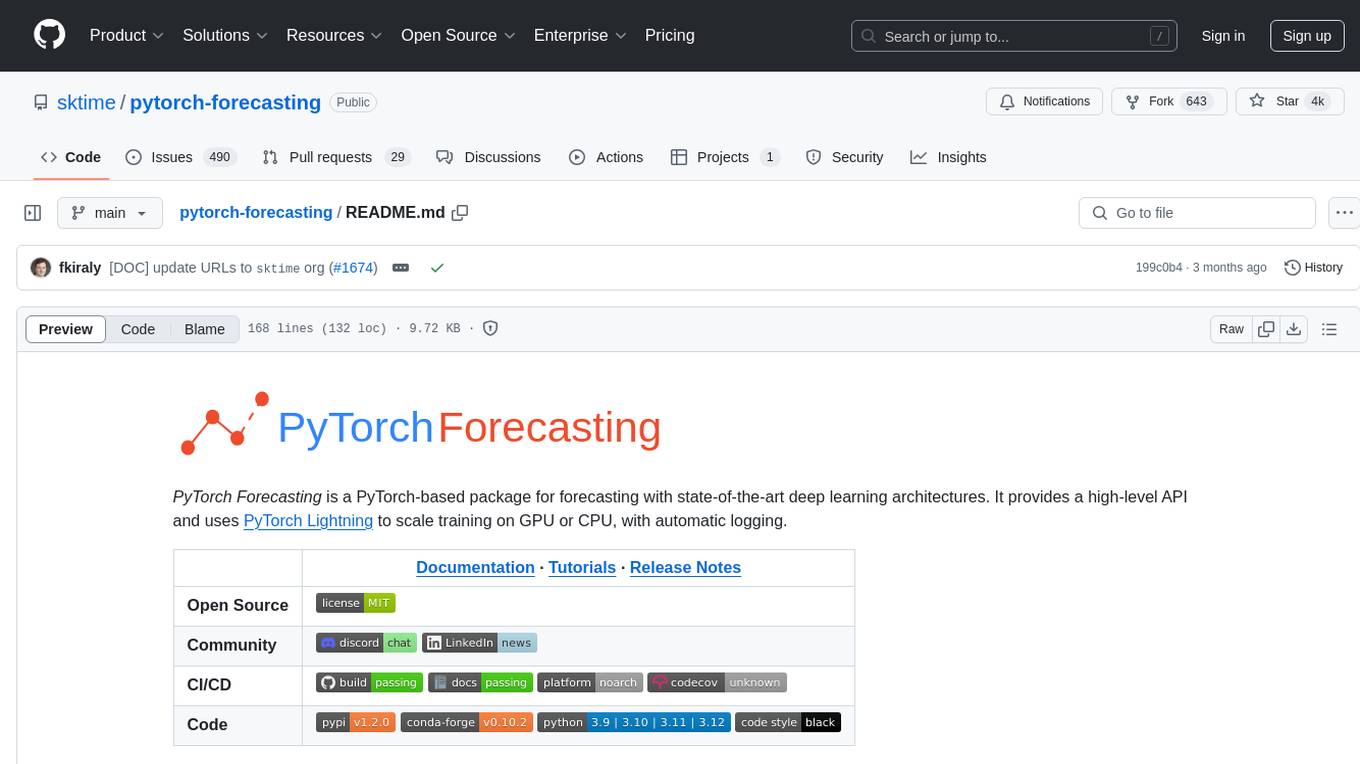
pytorch-forecasting
PyTorch Forecasting is a PyTorch-based package designed for state-of-the-art timeseries forecasting using deep learning architectures. It offers a high-level API and leverages PyTorch Lightning for efficient training on GPU or CPU with automatic logging. The package aims to simplify timeseries forecasting tasks by providing a flexible API for professionals and user-friendly defaults for beginners. It includes features such as a timeseries dataset class for handling data transformations, missing values, and subsampling, various neural network architectures optimized for real-world deployment, multi-horizon timeseries metrics, and hyperparameter tuning with optuna. Built on pytorch-lightning, it supports training on CPUs, single GPUs, and multiple GPUs out-of-the-box.
For similar jobs

promptflow
**Prompt flow** is a suite of development tools designed to streamline the end-to-end development cycle of LLM-based AI applications, from ideation, prototyping, testing, evaluation to production deployment and monitoring. It makes prompt engineering much easier and enables you to build LLM apps with production quality.

deepeval
DeepEval is a simple-to-use, open-source LLM evaluation framework specialized for unit testing LLM outputs. It incorporates various metrics such as G-Eval, hallucination, answer relevancy, RAGAS, etc., and runs locally on your machine for evaluation. It provides a wide range of ready-to-use evaluation metrics, allows for creating custom metrics, integrates with any CI/CD environment, and enables benchmarking LLMs on popular benchmarks. DeepEval is designed for evaluating RAG and fine-tuning applications, helping users optimize hyperparameters, prevent prompt drifting, and transition from OpenAI to hosting their own Llama2 with confidence.

MegaDetector
MegaDetector is an AI model that identifies animals, people, and vehicles in camera trap images (which also makes it useful for eliminating blank images). This model is trained on several million images from a variety of ecosystems. MegaDetector is just one of many tools that aims to make conservation biologists more efficient with AI. If you want to learn about other ways to use AI to accelerate camera trap workflows, check out our of the field, affectionately titled "Everything I know about machine learning and camera traps".

leapfrogai
LeapfrogAI is a self-hosted AI platform designed to be deployed in air-gapped resource-constrained environments. It brings sophisticated AI solutions to these environments by hosting all the necessary components of an AI stack, including vector databases, model backends, API, and UI. LeapfrogAI's API closely matches that of OpenAI, allowing tools built for OpenAI/ChatGPT to function seamlessly with a LeapfrogAI backend. It provides several backends for various use cases, including llama-cpp-python, whisper, text-embeddings, and vllm. LeapfrogAI leverages Chainguard's apko to harden base python images, ensuring the latest supported Python versions are used by the other components of the stack. The LeapfrogAI SDK provides a standard set of protobuffs and python utilities for implementing backends and gRPC. LeapfrogAI offers UI options for common use-cases like chat, summarization, and transcription. It can be deployed and run locally via UDS and Kubernetes, built out using Zarf packages. LeapfrogAI is supported by a community of users and contributors, including Defense Unicorns, Beast Code, Chainguard, Exovera, Hypergiant, Pulze, SOSi, United States Navy, United States Air Force, and United States Space Force.

llava-docker
This Docker image for LLaVA (Large Language and Vision Assistant) provides a convenient way to run LLaVA locally or on RunPod. LLaVA is a powerful AI tool that combines natural language processing and computer vision capabilities. With this Docker image, you can easily access LLaVA's functionalities for various tasks, including image captioning, visual question answering, text summarization, and more. The image comes pre-installed with LLaVA v1.2.0, Torch 2.1.2, xformers 0.0.23.post1, and other necessary dependencies. You can customize the model used by setting the MODEL environment variable. The image also includes a Jupyter Lab environment for interactive development and exploration. Overall, this Docker image offers a comprehensive and user-friendly platform for leveraging LLaVA's capabilities.

carrot
The 'carrot' repository on GitHub provides a list of free and user-friendly ChatGPT mirror sites for easy access. The repository includes sponsored sites offering various GPT models and services. Users can find and share sites, report errors, and access stable and recommended sites for ChatGPT usage. The repository also includes a detailed list of ChatGPT sites, their features, and accessibility options, making it a valuable resource for ChatGPT users seeking free and unlimited GPT services.

TrustLLM
TrustLLM is a comprehensive study of trustworthiness in LLMs, including principles for different dimensions of trustworthiness, established benchmark, evaluation, and analysis of trustworthiness for mainstream LLMs, and discussion of open challenges and future directions. Specifically, we first propose a set of principles for trustworthy LLMs that span eight different dimensions. Based on these principles, we further establish a benchmark across six dimensions including truthfulness, safety, fairness, robustness, privacy, and machine ethics. We then present a study evaluating 16 mainstream LLMs in TrustLLM, consisting of over 30 datasets. The document explains how to use the trustllm python package to help you assess the performance of your LLM in trustworthiness more quickly. For more details about TrustLLM, please refer to project website.

AI-YinMei
AI-YinMei is an AI virtual anchor Vtuber development tool (N card version). It supports fastgpt knowledge base chat dialogue, a complete set of solutions for LLM large language models: [fastgpt] + [one-api] + [Xinference], supports docking bilibili live broadcast barrage reply and entering live broadcast welcome speech, supports Microsoft edge-tts speech synthesis, supports Bert-VITS2 speech synthesis, supports GPT-SoVITS speech synthesis, supports expression control Vtuber Studio, supports painting stable-diffusion-webui output OBS live broadcast room, supports painting picture pornography public-NSFW-y-distinguish, supports search and image search service duckduckgo (requires magic Internet access), supports image search service Baidu image search (no magic Internet access), supports AI reply chat box [html plug-in], supports AI singing Auto-Convert-Music, supports playlist [html plug-in], supports dancing function, supports expression video playback, supports head touching action, supports gift smashing action, supports singing automatic start dancing function, chat and singing automatic cycle swing action, supports multi scene switching, background music switching, day and night automatic switching scene, supports open singing and painting, let AI automatically judge the content.
